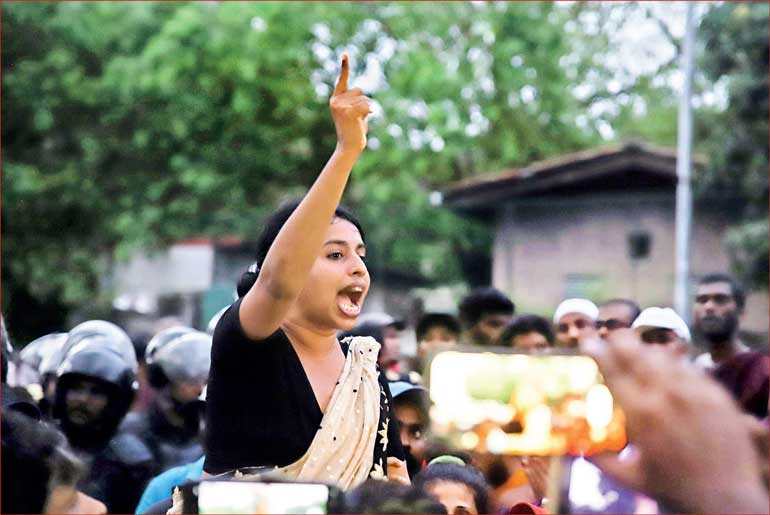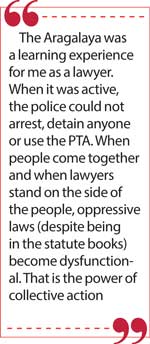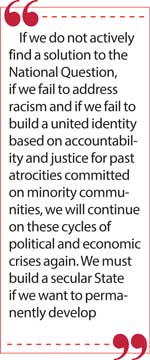Tuesday Feb 17, 2026
Tuesday Feb 17, 2026
Friday, 8 November 2024 00:00 - - {{hitsCtrl.values.hits}}

Swastika Arulingam
Swastika Arulingam, a 37-year-old civil and labour lawyer, is contesting the upcoming parliamentary elections from Colombo. Educated at Ladies College, Arulingam entered the Colombo Law College in 2008 before she qualified as a lawyer in 2011.
 She started her first job at the Legal Aid Commission and represented several persons who needed legal aid such as workers, shop vendors and those arrested under the Prevention of Terrorism Act (PTA). She has two masters: an LLM from the University of Colombo and an LLM and Development as a Chevening Scholar at School of Oriental and African Studies, University of London. She became President of the Commercial and Industrial Workers Union (CIWU) in 2022 and the United Federation of Labour (UFL)
She started her first job at the Legal Aid Commission and represented several persons who needed legal aid such as workers, shop vendors and those arrested under the Prevention of Terrorism Act (PTA). She has two masters: an LLM from the University of Colombo and an LLM and Development as a Chevening Scholar at School of Oriental and African Studies, University of London. She became President of the Commercial and Industrial Workers Union (CIWU) in 2022 and the United Federation of Labour (UFL)
in 2023.
She was seen in the protests in 2022, which called for the removal of Gotabaya Rajapaksa as president and also the upheaval of the political system (i.e. system change). Since then, she has joined the People Struggle Alliance (PSA) to further the system change which people from all tiers of society requested. Following are excerpts of an interview with Arulingam.
Q: What inspired you to become a politician?
A: I was born in Jaffna and displaced in 1990 to Colombo due to the Civil War. My family struggled because of their displacement from our home to a new city, with the possibility of never going back. It was also a dangerous time for Tamils who were displaced from the North to live in the South. Young Tamil people in Colombo were arrested under the Emergency Regulations and the military would come into houses to check on them. That shaped my early experience in learning what it meant to be watched by the State. I cannot compare myself to similar people who went through the same challenges with less resources to support them. But I understood what it meant to be a minority and woman in this country.
I entered the political arena when I joined the Legal Aid Commission in 2011-2012, where I met street-sellers and vendors harassed by the police, post-war communities who wanted their land back, police torture victims, refugees who were fleeing from international wars such as in Palestine and Eritrea and women who faced domestic violence. Here, I realised the law does not work equally, despite being told that it was neutral and objective. The law and the law enforcement was, in fact, on the side of the powerful. That was what pushed me into political activism.
Q: What role did the protests in 2022 play in your political journey?
A: One of the things which happened in the Aragalaya was the lawyers’ movement. Early morning, on 10 April, I got a call from a woman whose husband, a journalist, was arrested and tortured by the police and the STF. This was soon after the incident in Mirihana on 9 April. She asked me to check because she could not get access to him. When I went to the police station, I saw that multiple people were arrested and injured. The police, however, would not allow me to meet people which was unusual because it is customary for lawyers to meet arrested people.
Then I called Nuwan Bopage who called our colleagues, which is how the lawyers’ movement started. Even after the Aragalaya was brought to an end, there was a team of lawyers following up on Aragalaya cases. I am part of that team in Colombo.
The Aragalaya was a learning experience for me as a lawyer. When it was active, the police could not arrest, detain anyone or use the PTA. When people come together and when lawyers stand on the side of the people, oppressive laws (despite being in the statute books) become dysfunctional. That is the power of collective action.
Q: What are the main causes you stand for?
 A: I am President of the Commercial and Industrial Workers Union (CIWU). As President I meet workers from both formal and informal sectors. I work with and represent factory workers, BPO workers, plantation workers, informal sector workers, manpower workers, app based workers (such as PickMe and Uber), transport workers and construction workers. Through my trade union involvement, I have been able to access many workers and have taken up their issues such as the restructuring of the Employment Provident Fund (EPF). The workers have been losing their EPF savings since this restructuring started. The “EPF theft” is what we call it and we built a struggle against this.
A: I am President of the Commercial and Industrial Workers Union (CIWU). As President I meet workers from both formal and informal sectors. I work with and represent factory workers, BPO workers, plantation workers, informal sector workers, manpower workers, app based workers (such as PickMe and Uber), transport workers and construction workers. Through my trade union involvement, I have been able to access many workers and have taken up their issues such as the restructuring of the Employment Provident Fund (EPF). The workers have been losing their EPF savings since this restructuring started. The “EPF theft” is what we call it and we built a struggle against this.
Another struggle we are currently engaged in is the struggle against IMF conditionalities such as the draconian taxation, privatisation and labour law reforms which negatively impact workers.
Q: What are some main points potential voters should keep in mind?
A: My party, the PSA, has economists, lawyers and activists who are engaged on a regular basis on economic issues. We think about the IMF, debt restructuring and the rising cost-of-living. We propose policies which make people independent so they can decide their own future. The rising cost of living is not only because of the economic crisis—it is because the burden of the economic crisis has been placed on the ordinary people of this country. The business and political elites are not affected by the crisis but have benefited and profited from it.
Secondly, finding solutions to the race issue and the national question is vital for Sri Lanka. As the PSA, we have proposed ‘Self-Governing Territories’ and a ‘Dual Chamber’ in the centre. This model has previously been discussed in the country’s constitution-making history. We have also proposed the abolition of the Executive Presidency which has resulted in the erosion of democracy. We believe oppressive laws such as the PTA, the Online Safety Act (OSA), the Central Bank Act (CBA) and the economic transformation bill must end.
Our foreign policy is non-aligned. At the moment, we are too closely aligned with India and the USA. The moment Anura Kumara Dissanayake (AKD) came to power, Indian and US missions rushed to meet him. AKD had to agree to Ranil Wickremesinghe’s debt restructuring proposals. The implication of this will be visible in 2028 when we start repaying our debts.
Similarly, when the Adani Windmill Project was halted, India rushed in with a Light Rail Project which the Government had agreed to, in principle. Have they thought of the geopolitical implications of this? Have they thought of the environmental impact of such a project?
We are deeply concerned about development and how it is detrimental to the people of this country. Despite the fact that we have Directive Principles of State Property which talks about the environment, our Government has dismissed it. They have dislocated communities who have learnt to live and build their livelihoods while protecting the environment for future generations.
Take the fishing community in the Northern Province who have sustained their livelihood by conserving sea-resources. After the war, Indian trawlers raided our Northern seas and depleted our resources. Consecutive governments have failed to find any solution to the Indian trawlers which destroys our marine resources in the Northern part of the country.
The PSA is against destroying the environment for the sole purpose of short term profit making of a few businesses.
Q: Women in politics is a hot-topic in Sri Lanka. Why is gender diversity more important than ever?
 A: Women in politics is not a side issue for the PSA—it is a central issue for us. It is unbelievable that women make up 52% of the population but they struggle to enter electoral politics. In many of the districts, we have women candidates who can stand their ground, argue their case, have a political position and articulate their reasoning. We have solid women candidates who have worked with the community.
A: Women in politics is not a side issue for the PSA—it is a central issue for us. It is unbelievable that women make up 52% of the population but they struggle to enter electoral politics. In many of the districts, we have women candidates who can stand their ground, argue their case, have a political position and articulate their reasoning. We have solid women candidates who have worked with the community.
Q: What solutions do you have for the cost-of-living crisis and the IMF imposed austerity?
A: We will reduce the prices of essential goods such as rice and dhal. The Government will mediate prices directly with farmers so that there is a fixed price for goods and they will not make losses.
The tax bracket will be raised and higher taxes will be charged from high income earners. A wealth tax is also something which we have proposed.
The PSA will protect consumers and producers such as farmers and fishermen who produce our food. Economic stability starts with food sovereignty which previous governments and their advisors have destroyed in this country. These are not utopian ideas. Paddy boards responsible for price controls existed in the country. We had a functioning system for food production, pricing and distribution which was dismantled by policies from agencies like the IMF and also local corruption.
There is also the issue of uncollected taxes. The collection of tax takes political will because penalties need to be imposed on the elites of this country. Until now this has been impossible because it is the same people who have funded election campaigns of governments who have come to power. A PSA government will not have this problem because our politics are backed by ordinary people.
We will also draw lessons from how countries developed and placed financial controls. With the push of the IMF, our Government is irresponsibly lifting financial controls which will lead to capital flight.A lack of control over finance spells disaster in moments such as an economic crisis.
We will also repeal the Economic Transformation Act which has made IMF conditionalities into law.
There will be no privatisation of state-owned enterprises. Instead, we will ensure that they will become profit-making by taking a very strong stance on corruption and mismanagement. These are some of the main reasons investors do not come to our country.
We will protect free education, free healthcare and penalise all actions which threaten this. The education and health of our people is not for profit-making.
Q: This election voters heard more about anti-corruption and IMF negotiations than a solution to the National Question. Why is a solution to the National Question an important step in resolving the impact of the economic crisis?
A: If we do not actively find a solution to the National Question, if we fail to address racism and if we fail to build a united identity based on accountability and justice for past atrocities committed on minority communities, we will continue on these cycles of political and economic crises again. We must build a secular State if we want to permanently develop.